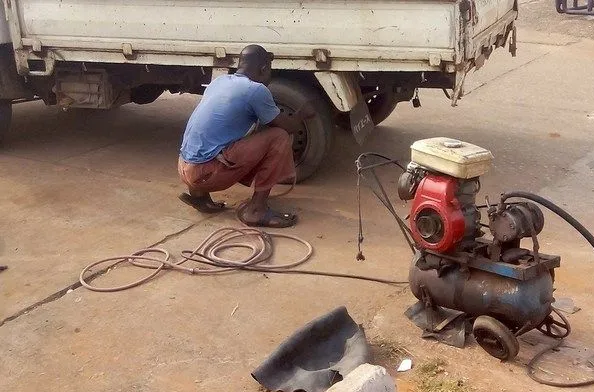A recent encounter with a vulcaniser or “bok-nasa” as they are popularly called made me recall my article, “Motorway Kamikaze Driving?” of March 2017 in which I wrote on the carnage on Ghanaian roads.
I used the Accra-Tema Motorway as a case study.
I stated that, “A combination of reckless driving, poorly maintained vehicles and bad roads make driving very unsafe in Ghana. Unfortunately, the police do not appear to enforce breaches of driving regulations by arraigning offenders before courts…….”
I concluded that these negative factors sentenced us prematurely to our maker through needless Road Traffic Accidents (RTAs).
The 2019 Kintampo accident which claimed over 70 lives and the January 2020 Dompoase accident in which 35 people died are examples. In February 2020 on the Motorway, a commercial vehicle burst a tyre and slammed into a private car. Five people died on the spot.
Unfortunately, COVID-19 news relegated news on RTAs in 2020 to the background.
Over-inflated tyres
Probably, what I did not include in my article was the contribution of vulcanisers to RTAs.
At a popular filling station recently, a vulcaniser pumped my tyres to 40 pounds per square inch (psi) contrary to my instructions for 30 psi.
When I drew his attention to his error, he told me in Twi, “Saa na y3y3 no ma obiara,” meaning “that is how we do it for everybody”.
When I educated him showing him the Manufacturers’ Instructions in the door of my car, he simply shrugged dismissively saying, “Master, some of us did not go to school like you o!”
So for him, 40 psi was a one-size-fits-all method, be the vehicle a 1200cc car or a truck.
Unfortunately, not all of us supervise these vulcanisers as they inflate our tyres. Indeed, I see people sit in their cars while vulcanisers inflate their tyres dangerously.
Experience outside
Bad as my recent experience in Accra may sound, my experience years ago with a vulcaniser outside Ghana was worse.
After instructing him to pump my tyres to 30 pounds psi, I got drawn into a chat with a colleague who drove in after me for the same service.
After having my tyres pumped without my supervision, I got on the highway. I immediately realised that my little Mitsubishi-Tredia was bouncing like a tennis ball. I, therefore, pulled off at the next filling station.
The vulcaniser there checked my front tyres to be 50 pounds psi, while the rear ones read 53.
Having had him reduce them to 30 psi, I drove back to the first vulcaniser. He confidently and cheerfully confirmed that he had pumped my front tyres to 50 psi and the rear tyres to 53 psi to make my car go faster and burn less fuel!
When I tried educating him, I hit a brick wall. He told me that was how he had always done it.
Burst tyres
I do not have statistics to show the contribution of over-inflated tyres to RTAs in Ghana. However, considering the number of tyre bursts that lead to deaths, I can say that vulcanisers contribute substantially to accidents on our roads.
So important are the state of tyres and their pressures that where I lived in the US, designated tyre centres do an assessment of tyres as part of routine Roadworthiness Certificate process.
Again if one tyre is faulty, all four have to be replaced. Unfortunately, it is such second-hand tyres that are brought in by Ghanaians and sold as “home-used”.
Obviously, the problem of RTAs has not been given the deserved attention because probably, those who die are not considered important in society. Such casualties are easily reduced to statistics.
Between January and June 2021, Police MTTD reported 1,450 persons killed in RTAs. Perhaps if those killed included “big men/women”, the attitude by leadership to road carnage would be different.
Conclusion
RTAs have deprived many families of loved ones/breadwinners. While speeding, mechanically faulty vehicles, bad roads, driving under the influence of alcohol/drugs and lack of law enforcement have been identified as some of the factors that lead to RTAs, what is not mentioned much is the state and pressures of over-inflated tyres. If unsure, please check the door of the driver’s seat. Manufacturers provide the information.
With the interest George Floyd’s murder in the US generated in Ghanaian leadership, “Ghanaian Lives Matter” must also be emphasised.
For as the vulcaniser told me, “Master, some of us did not go to school like you!”
Leadership, lead! Fellow Ghanaians, wake up!
The writer is former CEO, African Peace Support Trainers Association, Nairobi, Kenya & Council Chairman, Family Health University College, Accra.
E-mail: dkfrimpong@yahoo.com

